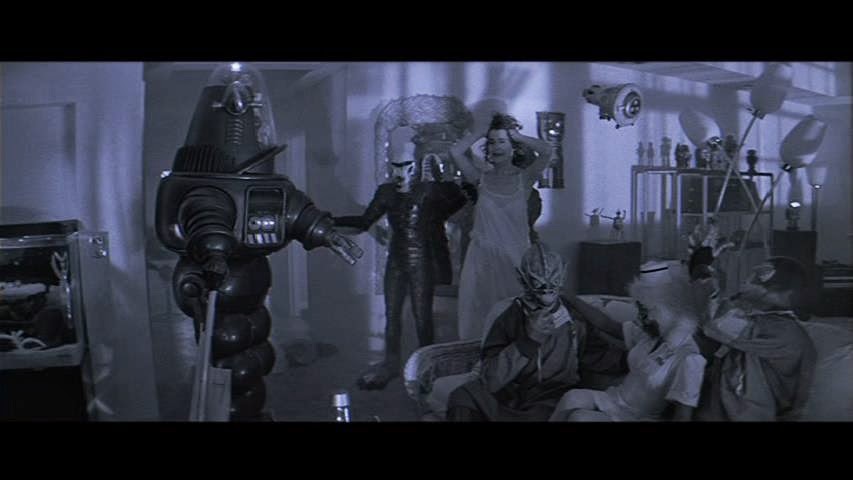(1988) Directed by: Julien Temple; Written by Julie Brown,
Charlie Coffey and Terrence E. McNally; Starring: Geena Davis, Jeff Goldblum,
Jim Carrey, Damon Wayans, Julie Brown and Charles Rocket;
Available on DVD
Rating: *** ½
Wiploc: Finland is
Here?
Valerie: Finland? No, this is the Valley. Finland is the
capitol of Norway. God, you guys sure
learn fast.
Why did I choose Jeff Goldblum as the focal point for my blogathon,
the Goldblumathon? Call it a man-crush if you will, or a deep
admiration for his signature acting style, but Goldblum is one of my favorite
performers. With his tall, gangly figure
that embodies the awkwardness of adolescence in an adult frame and distinctive
speech pattern (manic, with the hint of a James Stewart-esque stutter), he’s one
of the most idiosyncratic actors working in mainstream cinema. He may not be typical leading man material, but
when he does headline a picture, there’s usually a catch: he’s an eccentric
scientist (The Fly), fish-out-of-water
American (The Tall Guy), or in this
case, a love-struck alien.
Earth Girls Are Easy
encapsulates ‘80s kitsch in all its candy-colored glory, with its idealized depiction
of suburban Los Angeles* life. The title
(and nominal story line) is based on a novelty song by Dr. Demento regular
Julie Brown,** who co-wrote the screenplay, and also co-stars. Director Julien Temple incorporates many of
the Southern California landmarks instantly recognizable to anyone who’s ever
been there, while taking license with the geography. The Griffith Observatory becomes a tacky
dance club, and the filmmakers would have you believe that Inglewood is just
around the corner from Zuma Beach.
* Set in the San Fernando Valley (or colloquially, The
Valley).
** I don’t know if it’s Ms. Brown I have to thank for
coining the phrase “take a mental margarita,” but I picked it up from this
film, and I continue to use the term to this day. Yes, I’m aware that’s why I don’t have any
friends.
Guided by their raging space hormones, three furry aliens,
Mac, Zeebo and Wiploc (Jeff Goldblum, Damon Wayans and Jim Carrey,
respectively) crash-land their sex toy-shaped spacecraft into the pool of
suburbanite Valerie (played by Goldblum’s wife at the time, Geena Davis), and wacky
‘80s hijinks ensue. Before you can say “Nair,”
Valerie takes the aliens to the Curl Up & Dye salon, run by her boss Candy
(Julie Brown), to give them a human makeover.
Shorn of their body hair, the previously hirsute aliens embark on a
quest to party and meet women.
After he watches a clip from The Nutty Professor, Mac emulates Jerry Lewis’ pseudo-suave Buddy
Love character, in an attempt to woo Valerie.
Complicating matters is Valerie’s obnoxious yuppie fiancé Ted (Charles
Rocket), who sees the aliens as a means of furthering his medical career. Goldblum and Davis have nice chemistry
together, but how do I put it delicately? Valerie is a bit of a ditz. Who am I kidding? She’s a dim bulb. When she catches Ted with another woman, she kicks
him out, then proceeds to waffle about him for the rest of the movie. Since this isn’t a Shakespearean tragedy, it
shouldn’t come as a surprise that true love will conquer all in the end. Mac represents everything that Ted isn’t. He’s sensitive, attentive and loyal –
something that’s apparently in short supply on Earth.
Temple, no stranger to the musical format (with the
underrated Absolute Beginners) provides
lively direction to the goofy song and dance numbers, mostly written and
performed by Brown (“Cause I’m a Blond” is a personal favorite). Earth Girls Are Easy also includes a number
of affectionate nods to genre films. A creepy
fun dream sequence incorporates shots from Jean Cocteau’s Beauty & The Beast and Earth
vs. The Flying Saucers. Watch for cameos
from several iconic inanimate objects, including Robby the Robot, cars from Death Race 2000 and Angelyne.*
* Seriously, have you seen her attempt to act in this flick?
(Zing!). To the uninitiated, Angelyne
was an L.A. fixture in the ‘80s, more famous for being famous than anything
else. You couldn’t meander around La-La
Land without encountering one of her ubiquitous billboards advertising her dubious
talent.
25-plus years after my first viewing, I’m still unable to
see Earth Girls Are Easy with
anything approaching objectivity. Maybe
I’m looking back at the ‘80s with scuffed rose-colored glasses, but I can’t
help but appreciate the movie’s love letter to a fictional Los Angeles, as well
as its old-fashioned “let’s put on a show” vibe. At least for this reviewer, it’s a
combination that’s tough to resist.
Be sure to check out all of the great posts...
 |




















